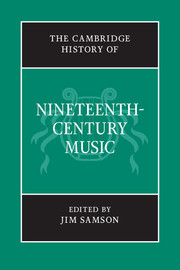Book contents
- Frontmatter
- Part One 1800–1850
- Part Two 1850–1900
- 11 Progress, modernity and the concept of an avant-garde
- 12 Music as ideal: the aesthetics of autonomy
- 13 The structures of musical life
- 14 Opera and music drama
- 15 Beethoven reception: the symphonic tradition
- 16 Words and music in Germany and France
- 17 Chamber music and piano
- 18 Choral culture and the regeneration of the organ
- 19 Music and social class
- 20 Nations and nationalism
- 21 Styles and languages around the turn of the century
- Chronology
- Institutions
- Personalia
- Index
- References
14 - Opera and music drama
from Part Two - 1850–1900
Published online by Cambridge University Press: 28 March 2008
- Frontmatter
- Part One 1800–1850
- Part Two 1850–1900
- 11 Progress, modernity and the concept of an avant-garde
- 12 Music as ideal: the aesthetics of autonomy
- 13 The structures of musical life
- 14 Opera and music drama
- 15 Beethoven reception: the symphonic tradition
- 16 Words and music in Germany and France
- 17 Chamber music and piano
- 18 Choral culture and the regeneration of the organ
- 19 Music and social class
- 20 Nations and nationalism
- 21 Styles and languages around the turn of the century
- Chronology
- Institutions
- Personalia
- Index
- References
Summary
Paris, 1850: Wagner and Meyerbeer
In the winter months of 1850 Richard Wagner found himself once again in Paris – and not for the last time – with the aim of improving his fame and fortune. Around the middle of February he heard a performance of Meyerbeer’s latest sensation, Le prophète, which had received its première ten months earlier (16 April 1849), although the origins of the work stretch back to the 1830s. In his autobiography Wagner recounts how he noisily exited the theatre in revulsion at the stock operatic roulades to which the false prophet’s mother, Fidès, pours out her grief in the famous Act IV finale. In this new opera he perceived the ‘ruins’ of all the noble aspirations of the 1848 revolution; he read it as a sign of the complete moral and aesthetic bankruptcy of the French provisional government, the ‘dawning of a shameful day of disillusionment’ for art, society and politics alike. For Wagner, a rather more hopeful dawn was soon to be signalled by the première of his own Lohengrin under Franz Liszt’s drection at Weimar in August 1850, if under musical conditions rather less auspicious than those enjoyed by Le prophète in Paris.
This nexus of events provides an apt starting-point for surveying operatic developments of the following half-century. The dialectic of Wagner vs. Meyerbeer, as manifested in the examples of Lohengrin and Le prophète, informs a broad spectrum of the operatic repertory to nearly the end of the century – certainly well into the 1880s, when Wagner’s mature ‘music dramas’ gradually displaced the influential spell of his ‘Romantic operas’ Tannhäuser and Lohengrin.
- Type
- Chapter
- Information
- The Cambridge History of Nineteenth-Century Music , pp. 371 - 423Publisher: Cambridge University PressPrint publication year: 2001
References
- 2
- Cited by

